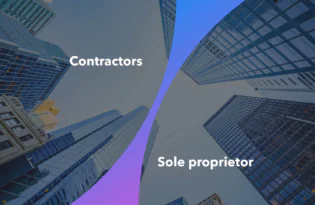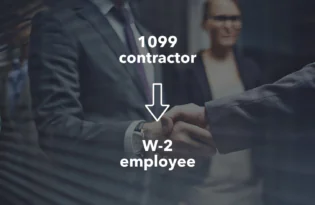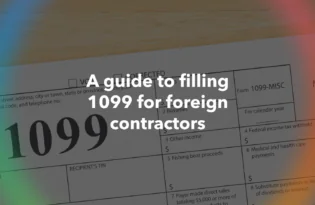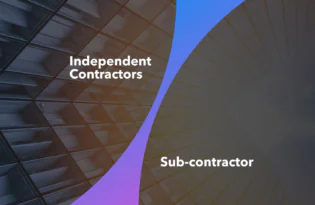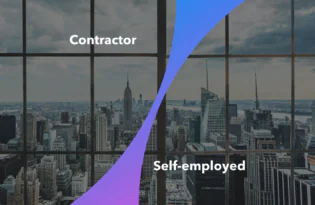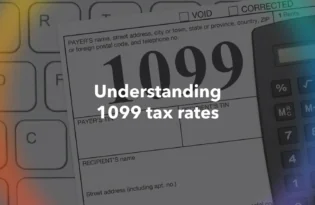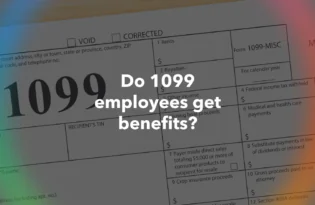What international contractors need to know about 1099s
Learn how 1099 reporting for international contractors works, including tax rules, compliance tips, and whether it’s required for overseas freelancers.
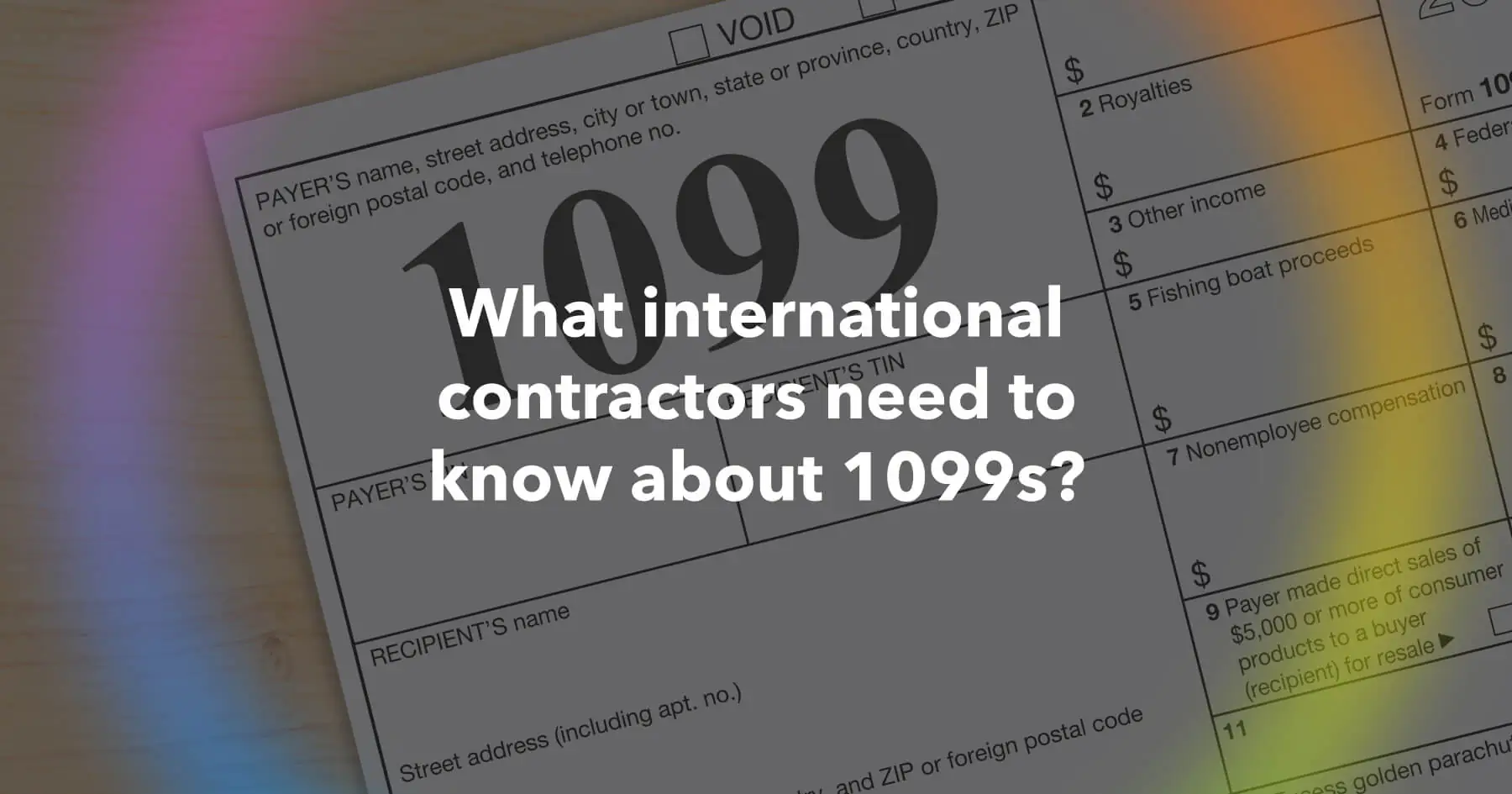
As global hiring becomes more common, businesses must navigate varying tax and compliance obligations.
A frequent area of uncertainty is 1099 reporting for international contractors. Unlike domestic freelancers, international contractors may not fall under the same reporting requirements. However, determining when a 1099 form is applicable requires careful consideration of tax residency, payment channels, and U.S. IRS guidelines.
This guide provides a clear overview of the rules, exceptions, and best practices to help companies remain compliant while managing a distributed workforce. If you’re engaging one contractor or building a global team, understanding these fundamentals can aid in performing sound operations.
What is a 1099 form?
Form 1099 is a set of documents used in reporting different types of income that aren’t related to regular wages, salaries, or tips.
1099 reporting for international contractors (independent) Form 1099-NEC (Non-employee Compensation), which reports payments of $600 or more made to a contractor in a calendar year.
This form is issued by the payer and sent to both the contractor and the IRS, ensuring that self-employment income is properly reported for tax purposes.
Who must receive a 1099?
As per IRS guidelines, U.S. businesses must issue a 1099-NEC to any independent contractor who is a “U.S. person”, meaning a U.S. citizen, resident alien, or domestic entity, and who has been paid at least $600 or further for services yearly.
For tax purposes, the IRS considers anyone who is a U.S. citizen or lawful resident to be a “U.S. person,” even if they live or work outside the United States.
Do international contractors get 1099 reporting?
The answer to 1099 reporting for international contractors depends on the contractor’s citizenship, residency, and where the work is performed:
U.S. citizens or residents living abroad
If a contractor is a U.S. citizen or resident, even if they live outside the United States, the payer must issue a 1099-NEC if payments exceed $600 in a year. This is levied on U.S. citizens and residents on their global income.
Non-U.S. persons performing work in the U.S
If a foreign contractor is not a U.S. citizen or resident but performs services while physically present in the United States, the payer may be required to report payments on Form 1099-NEC or Form 1099-MISC if they satisfy the Substantial Presence Test (SPT), depending on the circumstances.
However, in most cases, payments to non-U.S. persons for work performed in the U.S. may instead be reported on Form 1042-S (Annual Withholding Tax Return for U.S. Source Income of Foreign Persons), especially if tax was withheld.
Non-U.S. persons performing work outside the U.S
In terms of 1099 reporting for international contractors, if the vendor is not a U.S. person and performs all services outside the United States, the payer is not required to issue a 1099. Instead, the payer should collect Form W-8BEN (for individuals) or W-8BEN-E (for entities) to document the contractor’s foreign status.
Penalties of non-compliance
Failure to comply with IRS 1099 reporting requirements exposes businesses to significant penalties. Here’s an in-depth look at the penalties:
- Monetary penalties: Late or incorrect 1099 forms: $60–330 per form, depending on how late the filing is.
- Intentional disregard: $660 per form, with no maximum penalty.
- Cumulative impact: Penalties apply per form, so multiple errors can lead to substantial costs.
- Increased scrutiny: Repeated non-compliance may result in IRS audits or further investigations.
- Penalties for incorrect information: Even timely filings can incur penalties if information (such as TINs) is incorrect.
Note: Penalties may be waived if you can demonstrate reasonable cause, but this is not guaranteed.
Best practices for hiring international contractors
Hiring international contractors offers flexibility and access to global talent, but it also comes with compliance responsibilities. For smooth operations and to reduce legal pitfalls during 1099 reporting for international contractors, here are a few best practices to keep in mind:
- Determine the contractor’s status: Verify whether the contractor is a U.S. person or a foreign national, and where the work will be performed.
- Collect the right forms: For U.S. persons, collect a W-9. For foreign contractors, collect a W-8BEN (individual) or W-8BEN-E (entity).
- Understand reporting obligations: Know when to issue a 1099-NEC, when to use Form 1042-S, and when no reporting is required.
- Maintain records: Keep all tax forms and supporting documentation for at least four years, as the IRS may request them during an audit.
- Seek professional advice: When in doubt, consult a tax professional or use a reputable payroll provider to ensure compliance.
Platforms like Payoneer Workforce Management offer contractor management tools that can help simplify the process, allowing businesses to onboard international contractors and manage cross-border payments and reporting all in one place.
Engage global talent with Payoneer Workforce Management
Payoneer Workforce Management helps streamline the contractor management process by facilitating seamless support with onboarding and payments.
Wondering how to pay international contractors?
With Payoneer Workforce Management, one can track payments, approve invoices, and simplify global workforce management, allowing businesses to focus on growth while staying compliant.
Book a demo to see how Payoneer Workforce Management can support.
FAQs
1) Do I need to file a Form 1099 reporting for international contractors who are not U.S. persons?
According to the IRS, you are not required to file Form 1099-NEC for payments made to foreign (non-U.S.) persons if all services are performed outside the United States. Instead, you should obtain a completed Form W-8BEN (for individuals) or W-8BEN-E (for entities) to document the payee’s foreign status.
2) How to pay international contractors using Form 1099?
For payments to foreign individuals or entities for services performed outside the U.S., you must collect a completed Form W-8BEN (for individuals) or Form W-8BEN-E (for entities). If the recipient qualifies as a U.S. person, even while living overseas temporarily, you may be required to file Form 1099-NEC if annual payments reach $600 or more.
3) What rules apply for reporting and withholding when a foreign contractor works within the U.S.?
If a foreign contractor performs any part of their work while physically present in the United States and they meet the requirements of the Substantial Presence Test (SPT), the payment is generally considered U.S.-source income. In this case, you may be required to withhold tax (typically at 30% unless a tax treaty applies) and report the payment on Form 1042-S (Annual Withholding Tax Return for U.S. Source Income of Foreign Persons), not Form 1099 for international vendors.
Related resources
Latest articles
-
Employment laws in Sweden
Explore the employment laws in Sweden, a comprehensive guide to employees’ rights, employer obligations, and fair labor practices.
-
Employment laws in Poland
Explore the ins and outs of employment laws in Poland, an info-rich guide to employees’ rights, employer obligations, and fair labor practices that shape the future.
-
Employment laws in Indonesia
Find out more about Indonesia labor laws that dictate how employees should be contracted, managed, and paid, both on a national and state/territory level.
-
Employment laws in France
Learn about France’s labor laws dictating minimum wage, benefits, and more. Plus, discover the consequences of non-compliance with employment laws in France.
-
Employment laws in Spain
Find out more about Spain’s labor laws, from contracts and benefits to termination rules.
-
Employment laws in Australia
Find out more about the employment laws in Australia that dictate how employees should be contracted, managed, and paid, both on a national and state/territory level.
Disclaimer
The information in this article/on this page is intended for marketing and informational purposes only and does not constitute legal, financial, tax, or professional advice in any context. Payoneer and Payoneer Workforce Management are not liable for the accuracy, completeness or reliability of the information provided herein. Any opinions expressed are those of the individual author and may not reflect the views of Payoneer or Payoneer Workforce Management. All representations and warranties regarding the information presented are disclaimed. The information in this article/on this page reflects the details available at the time of publication. For the most up-to-date information, please consult a Payoneer and/or Payoneer Workforce Management representative or account executive.
Availability of cards and other products is subject to customer’s eligibility. Not all products are available in all jurisdictions in the same manner. Nothing herein should be understood as solicitation outside the jurisdiction where Payoneer Inc. or its affiliates is licensed to engage in payment services, unless permitted by applicable laws. Depending on or your eligibility, you may be offered the Corporate Purchasing Mastercard, issued by First Century Bank, N.A., under a license by Mastercard® and provided to you by Payoneer Inc., or the Payoneer Business Premium Debit Mastercard®, issued and provided from Ireland by Payoneer Europe Limited under a license by Mastercard®.
Skuad Pte Limited (a Payoneer group company) and its affiliates & subsidiaries provide EoR, AoR, and contractor management services.

